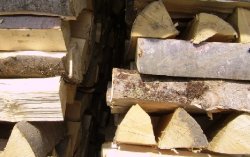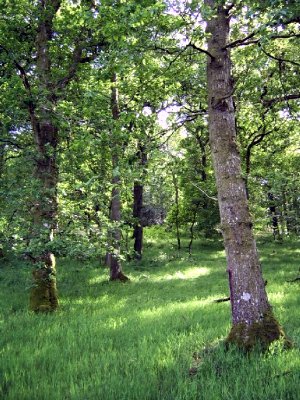Wood as a fuel will never be able to supply everyone’s nee ds, but growing wood works well in Wales and has a part to play in as a sustainable and renewable source of energy.
ds, but growing wood works well in Wales and has a part to play in as a sustainable and renewable source of energy.
Guest author Dorienne Robinson of Crooked Pool Logs writes about the growing demand for wood as a fuel and about the implications for the local environment.
Climate change and post peak oil are now familiar topics of conversation for most people. While some folk may still remain sceptical about what is causing climate change, the fact that our weather patterns are changing is irrefutable. You only need to look out of the window, or try growing your own veg' to know that summers are not as consistently good as they used to be, and winters have been considerably colder.
Equally undeniable is the supply of fossil fuels, which indirectly and directly support all systems that our modern society has come to rely on, is in decline. With increasing population figures and a universal desire to emulate the western lifestyle by developing countries, while the west strives to hang on to the lifestyle it has developed, fossil fuel supplies are predicted to collapse well within our life times.
Much is being done to develop alternative sustainable fuel production sources, including wind, wave and sun and bio-fuels. Some of these systems are controversial, either because of how the fuel is produced or because of where they are situated. Big business still leans towards large-scale central production of energy, including massive wind farms and huge tidal barriers in order to feed huge amounts of energy into the national grid in the easiest and most profitable way.
Fortunately Governments various have deemed it appropriate to help and support small-scale home production. The Labour Party had the Low Carbon Building Programme (LCBP), which enabled householders to access funding to purchase solar thermal systems. This was axed by the Conservatives who then created the Renewable Heat Incentive (RHI), initially aimed at the commercial sector but with additional funding for domestic properties in 2012.
 One area of energy production that is particularly well suited to Wales is seasoned firewood. Over the last two years sales of wood burners and wood burning Rayburns and agas has gone up by 120%. This creates the need for a similar increase in the production of the timber used to fuel them. Nobody wants to see vast tracks of Welsh woodland clear felled for fuel, and indeed this couldn’t happen as all felling over a certain acreage has to be licensed by the Forestry Commission and the chances are they would not give the go ahead for this to happen. However, this new market for firewood does create the opportunity for many small and neglected woodlands to be sensitively managed to produce a crop of fuel while at the same time improving habitat and the woods own long-term viability. Many small woods are becoming ‘community’ woodlands where recreation and education are other ‘yields’.
One area of energy production that is particularly well suited to Wales is seasoned firewood. Over the last two years sales of wood burners and wood burning Rayburns and agas has gone up by 120%. This creates the need for a similar increase in the production of the timber used to fuel them. Nobody wants to see vast tracks of Welsh woodland clear felled for fuel, and indeed this couldn’t happen as all felling over a certain acreage has to be licensed by the Forestry Commission and the chances are they would not give the go ahead for this to happen. However, this new market for firewood does create the opportunity for many small and neglected woodlands to be sensitively managed to produce a crop of fuel while at the same time improving habitat and the woods own long-term viability. Many small woods are becoming ‘community’ woodlands where recreation and education are other ‘yields’.
U.K. wide, and even Wales wide, Wood fuel will never be able to supply everyone’s needs bit it does have a vital part to play in the local production of sustainable and renewable energy. And, of course, unlike wind, wave and solar energy wood fuel production actually locks up carbon di-oxide, which is the main contributor to climate change.
Our company, Crooked Pool Logs Ltd, is based just outside Newbridge-on-Wye and sources local timber for firewood. We also offer a sensitive woodland management service using one of only six low impact tracked skidders in the country; we also offer on site firewood extraction and processing with our portable hydraulic splitter.
This year we have increased the scale of our operations and would be delighted to hear from anyone considering changing to wood fuel heating and energy production. Contacting us early in the year so that winter wood fuel needs can be assessed enables us to guarantee continuity of supply.
For more information on Crooked Pool Logs Ltd please go to our website:
www.crookedpool-logs.co.uk
For more information our sensitive woodland management service please visit our sister company LIWS (Low Impact Woodland Services) www.liws.co.uk
The views expressed in this article are those of the guest author and not necessarily of TLT. TLT welcomes articles from any local company with something to say about Transition topics.






